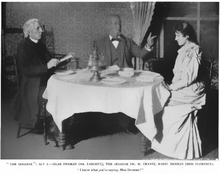
John Barrymore was an American actor on stage, screen, and radio. A member of the Drew and Barrymore theatrical families, he initially tried to avoid the stage, and briefly attempted a career as an artist, but appeared on stage together with his father Maurice in 1900, and then his sister Ethel the following year. He began his career in 1903 and first gained attention as a stage actor in light comedy, then high drama, culminating in productions of Justice (1916), Richard III (1920), and Hamlet (1922); his portrayal of Hamlet led to him being called the "greatest living American tragedian".
Born Yesterday is a play written by Garson Kanin which premiered on Broadway in 1946, starring Judy Holliday as Billie Dawn. The play was adapted into a successful 1950 film of the same name.

Ethel Barrymore was an American actress and a member of the Barrymore family of actors. Barrymore was a stage, screen and radio actress whose career spanned six decades, and was regarded as "The First Lady of the American Theatre". She received four nominations for the Academy Award for Best Supporting Actress, winning for None but the Lonely Heart (1944).

In American theater, summer stock theater is a theater that presents stage productions only in the summer. The name combines the season with the tradition of staging shows by a resident company, reusing stock scenery and costumes. Summer stock theaters frequently take advantage of seasonal weather by having their productions outdoors, under tents set up temporarily for their use, or in barns.

An Ideal Husband is a four-act play by Oscar Wilde that revolves around blackmail and political corruption, and touches on the themes of public and private honour. It was first produced at the Haymarket Theatre, London in 1895 and ran for 124 performances. It has been revived in many theatre productions and adapted for the cinema, radio and television.

Mabel Taliaferro was an American stage and silent-screen actress, known as "the Sweetheart of American Movies."

Preston Bierce Plumb was a United States senator from Kansas, as well as an officer in the Union Army during the American Civil War.
Josephine Porter Crane was an American socialite and patron of the arts, co-founder and original trustee of the Museum of Modern Art and supporter of the Dalton School of New York City.
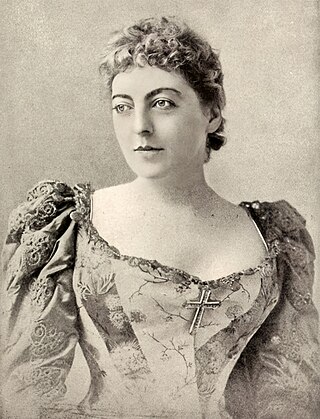
Georgiana Emma Drew, a.k.a.Georgie Drew Barrymore, was an American stage actress and comedian and a member of the Barrymore acting family.
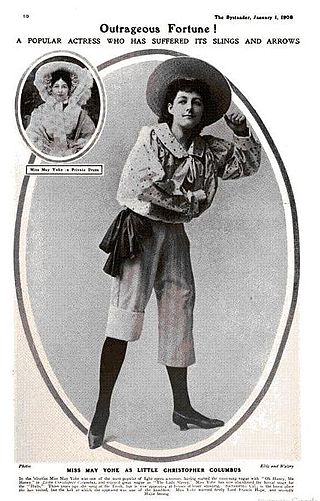
Little Christopher Columbus is a burlesque opera in two acts, with music by Ivan Caryll and Gustave Kerker and a libretto by George R. Sims and Cecil Raleigh. It opened on 10 October 1893 at the Lyric Theatre in London and then transferred to Terry's Theatre, running for a total of 421 performances, which was a very successful run at the time. May Yohé created the title role, and Furneaux Cook and E. J. Lonnen were in the cast. Mabel Love, Geraldine Ulmar and Florence St. John joined the cast as replacements.

Laura Nelson Hall was an actress in theater and vaudeville stock companies in the late 19th century and early 20th century.

The Man from Blankley's is a lost 1930 American pre-Code comedy film, directed by Alfred E. Green. It starred John Barrymore and Loretta Young. The film was based on the 1903 play by Thomas Anstey Guthrie, writing under the pseudonym "F. Anstey". The film was Barrymore's second feature length all-talking film. A previous silent film version of Anstey's play by Paramount Pictures appeared in 1920 as The Fourteenth Man starring Robert Warwick. That version is also lost.

Helen Louise Prettyman Arnold was an American silent film actress who appeared in motion pictures from 1916 to 1918.

Silas Hare was an American lawyer and politician who served two terms as a U.S. Representative from Texas from 1887 to 1891.

Sydney Rosenfeld (1855–1931) was an American playwright who wrote numerous plays, and adapted many foreign plays. Close to fifty of his creations played on Broadway.

Pique is an 1875 play produced by Augustin Daly, which had a very successful run of 237 consecutive performances in New York at the Fifth Avenue Theatre.
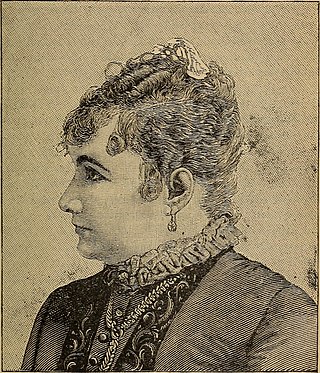
Elizabeth "Kitty" Blanchard was an American stage actress from Pennsylvania. A popular actress in 1870s and 1880s, she married actor McKee Rankin (1841–1914). Their children married into several other famous stage families, such as the Barrymores, Drews, and Davenports. In the 1870s she costarred along with Kate Claxton in the popular hit play The Two Orphans. In 1894 she was a member of the cast in the New York production of Arms and the Man, one of the earliest American appearances of a George Bernard Shaw play. Towards the end of her life, she and McKee Rankin came out of retirement in October 1911 and performed in a play called Peace on Earth.
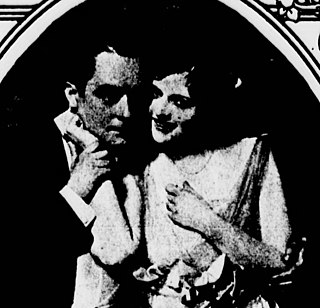
Forrest Winant (1888–1928) was an American stage and silent screen actor. He usually played amiable juveniles but his work became more cagey and challenging as he aged. He attended the Stevens Institute at Hoboken, New Jersey and participated in some amateur plays before making his professional debut in 1907. He appeared in The Country Boy (1910) with Willette Kershaw, The Family Cupboard (1913) with Irene Fenwick and more famously Kick In(1914) with Jane Grey and John Barrymore. The latter play feature a fight scene on stage between Winant and Barrymore.
William Ingersoll was an American actor on stage, in musical theatre and in film. During a career spanning over five decades, he played more than 800 roles on stage. After performing in his first silent motion picture in 1920, he appeared in a handful of "talkies" in the 1930s, playing mainly character roles such as doctors, judges and a police commissioner.
Don't Play Us Cheap is a musical play with music, lyrics, and a musical book by Melvin Van Peebles. The musical is based on Van Peebles' 1967 French-language novel La fête à Harlem (1967). Set in Harlem, the musical premiered in November 1970 at San Francisco State College.
